We often receive questions about our essential oils, and many customers are curious about the quality of our product, especially in relation to our low prices. We’ve assembled a few of the most frequently asked questions here for your reference.

How are your oils extracted?
Our citrus oils are extracted by a cold process of expeller pressing. The rest of our oils are steam distilled from their plant parts. Read more here about how our oils are made.
Are the oils “low heat steam distilled”?
212 degrees is the lowest temperature at which water turns to steam. Steam can be heated much higher than 212 degrees, but steam will turn back into water before its temperature gets lower than 212 degrees. We use temperatures appropriate to each kind of plant product; some plants will release their oils at lower temperatures than others. Our oils are distilled at the lowest heat possible to extract the desired component parts, and they are tested to have sufficient active components to meet our standards.
What’s the quality level, and how is it assured?
Our oils are 100% pure, unadulterated, uncontaminated, and undiluted. Every batch is sample tested to make sure that this is so, before bottling, during bottling, and after bottling. The oils are tested for purity by gas chromatography, infrared spectroscopy, or both, as well as any other testing appropriate to that oil from a wide range of available technologies.
It is possible to have a totally pure and undiluted oil that is functionally dead. To ensure maximum potency, tests are also performed to make sure that the oils meet a certain standard of active components.
 My second bottle of Lavender doesn’t smell the same as my first bottle did.
My second bottle of Lavender doesn’t smell the same as my first bottle did.
Variations are natural and inherent in any plant-based product. Think of how one crop of strawberries might be sweeter, or more red than another. In the same way, two pure and undiluted essential oils of the exact same variety but different batches could smell different, and it is not because of a difference in quality.
How long do essential oils last?
Because so many essential oils have inherent antibacterial properties, they generally have very long shelf lives if stored properly (in tightly-capped dark glass, away from heat and light, refrigerated if possible). In fact, certain oils are sometimes used in small amounts as a natural preservative agent in other products. Most undiluted oils will maintain potency for 2-3 years or longer, and will be used up long before rancidity becomes a factor.
Are your essential oils “therapeutic”, “aromatherapy”, or “medicinal grade”?
Unlike the “USDA Organic” seal you have probably seen on vegetables and packaged products in the supermarket, or the United States Pharmacopoeia (USP) labeling on medicines, you won’t see official labeling on essential oil products simply because there are no official standards or grades for quality or purity. Therefore, quality control and claims of efficacy are left up to each company.
“Therapeutic grade” oil is a term generally understood to be the highest quality grade of essential oil, but without any enforcement around these terms, anyone can claim to carry “therapeutic grade” oils. Some companies have actually trademarked terms like “therapeutic grade” or “medicinal grade”. This is done in an attempt to differentiate themselves in a competitive industry and make it appear that their products alone meet some kind of higher standards. In reality, there are no official standards, and such trademarked terms are meaningless marketing.
Certainly not all oils are the same quality, and there is no way to find out the genuine quality of most oils short of sending samples for laboratory testing. It comes down to simple integrity. Beeyoutiful is committed to full disclosure and will never make meaningless claims about our products. While our oils are indeed embraced by many for therapeutic and medicinal uses, we refuse to label them with empty words.
For more information on grading oils, read this helpful article.
 Is it safe to take your essential oils internally?
Is it safe to take your essential oils internally?
If we were to simply answer a blanket yes to this question, and a customer went out and drank an entire bottle of Eucalyptus Oil, they would most likely get very sick. Essential oils are very concentrated, very powerful, and should be respected and very carefully and sparingly used. Some oils are safe in tiny doses; some oils should never be used internally, ever. In addition, there is no single oil that is perfectly safe for everyone. Something that is safe for one person may not be safe for others, especially children, due to various underlying health conditions (including pregnancy), other medications, allergies or sensitivities.
We cannot tell you what is safe for you. We are not doctors and we cannot prescribe. Our goal is to be very clear about the high quality, purity, and stringent testing of our products and trust that our customers will do their own thorough research and use the products intelligently. In our personal experience, if a particular 100% pure, unadulterated, undiluted essential oil is considered by industry experts to be safe for a specific use, including internal, we are comfortable using ours in that way in our own homes.
If your oils are of such good quality, good enough to that you use them internally, why are the bottles labeled “For Aromatherapy Use Only”?
In order for us to advertise our products for internal use, we would be obliged to meet stringent legal requirements and pay literally millions of dollars each year for liability insurance. Doing this would entail a mountain of work for our very small staff and greatly increase our risk in the marketplace, not to mention raise prices dramatically for our customers. We choose instead to focus on getting quality products out into the hands of people who have learned how to use them safely, and doing our small part to educate more people in the use of great products.
 How can your oils be priced so inexpensively if they are of such excellent quality?
How can your oils be priced so inexpensively if they are of such excellent quality?
Along with lowering our costs and liability as mentioned above, we usually try to get a species of plant that is not the rarest and most expensive. There are something like 200 species of lavender, so if you compare the Latin species names on our bottle of lavender with a different manufacturer, they will almost certainly be different. (Note: sometimes plant species is very important, e.g. German vs. Roman Chamomile, and sometimes it is not important at all. Research your oils and insist on knowing what variety is in the bottle!)
Many companies in niche industries like to use a network marketing or distributor-based business model. This means that there are many people along the chain that have to get paid in the form of commissions on each sale. These layers of costs can’t help but make the products much more expensive when they finally get into your hands.
Instead, we work directly with family-owned manufacturers who don’t gouge us on price, and we pass on the savings by selling our oils directly to you at a price that’s not artificially inflated. We have a comfortable margin of profit that lets us pay the bills, do research, and put out training materials, and that is how we choose to price all of our products, including our essential oils. In this way, we’re able to keep the prices lower than many other companies.
Read this article for an introduction to using Beeyoutiful’s essential oils. We recommend The Complete Book of Essential Oils and Aromatherapy as a handy home reference tool. Consider signing up for our email series offering 101 Ways to Use Essential Oils.

 Omega 3’s
Omega 3’s




 But then the more we Beeyoutiful women learned about and used Cedarwood, we found its benefits and subtle aromatic nuances were delightful for both genders and all ages! It’s a team favorite now.
But then the more we Beeyoutiful women learned about and used Cedarwood, we found its benefits and subtle aromatic nuances were delightful for both genders and all ages! It’s a team favorite now.


 Sunshine Day Massage Oil Blend
Sunshine Day Massage Oil Blend


 18. Make your own burn relief spray.
18. Make your own burn relief spray.










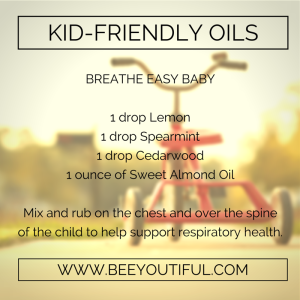








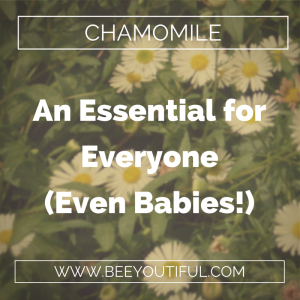 It’s an investment in your family’s health.
It’s an investment in your family’s health. 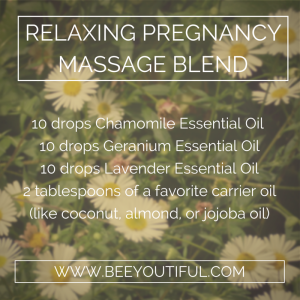 A massage with special floral oils is a comforting treatment during this special time. A spouse or another loving family member or friend can do the honors. Studies have shown that both mothers and babies benefit from regular massage during pregnancy, and massage by the baby’s father contributes substantially to his bonding with mother and baby.
A massage with special floral oils is a comforting treatment during this special time. A spouse or another loving family member or friend can do the honors. Studies have shown that both mothers and babies benefit from regular massage during pregnancy, and massage by the baby’s father contributes substantially to his bonding with mother and baby.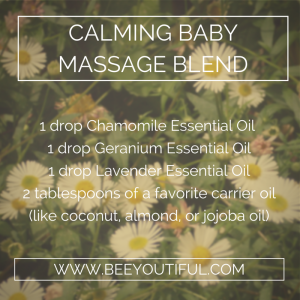
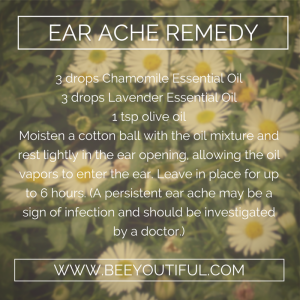 Ear Ache Remedy
Ear Ache Remedy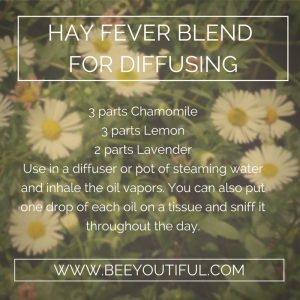 Hay Fever Blend for Diffusing
Hay Fever Blend for Diffusing